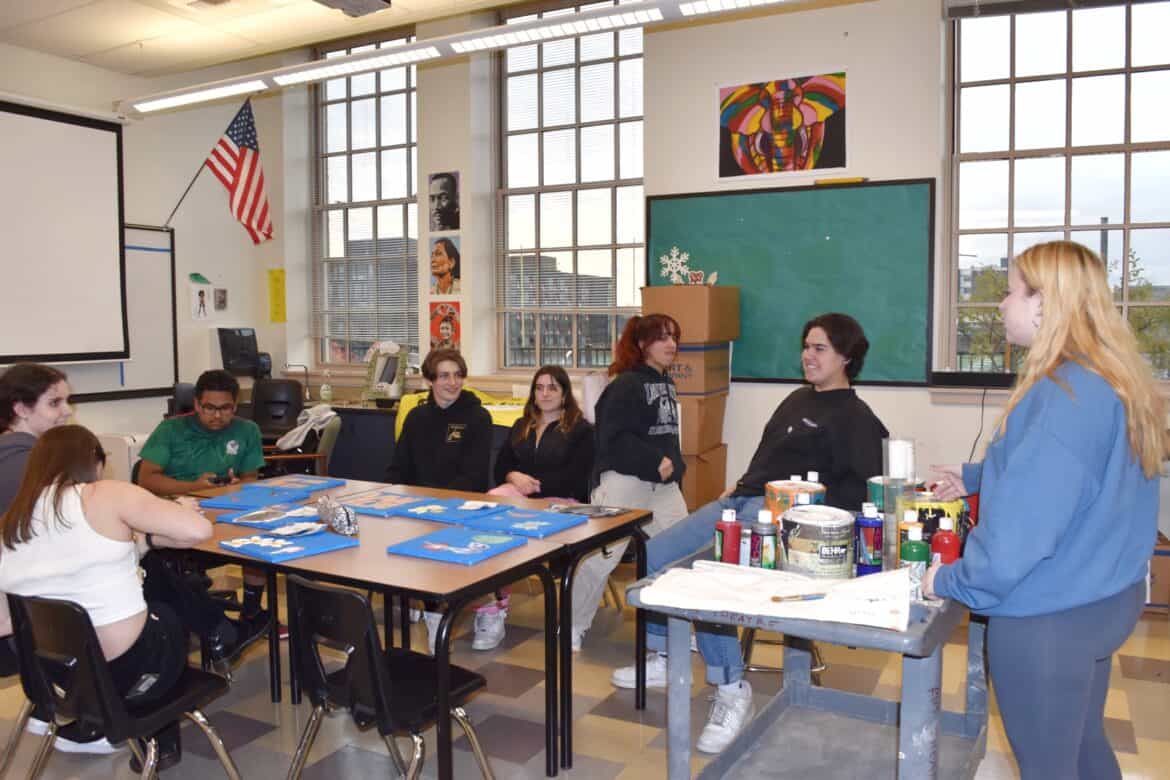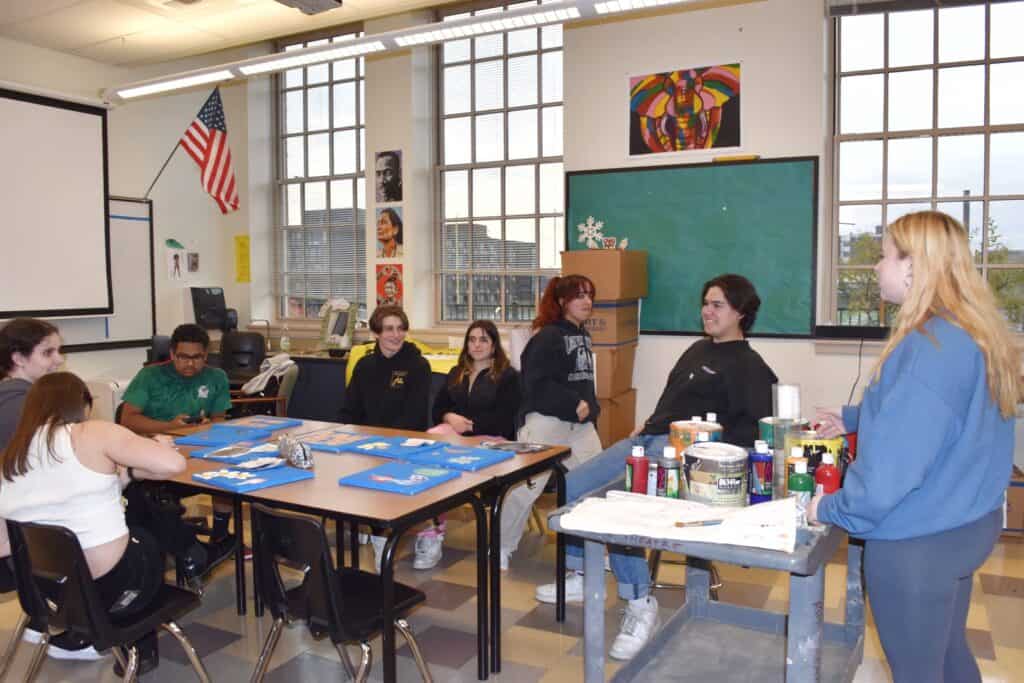
Each Roosevelt High School student has a unique cultural background, and a unique experience of how they balance their culture, social life, high school experience, and family life. multiracial and ethnic heritage of Latinos
One outlet for students to honor their heritage and find community is through cultural affinity groups. Roosevelt is home to several cultural affinity groups, including the Asian Culture Club, La Raza, the Black Student Union, the Jewish Student Union, and others.
Several members of these organizations vouch for their positive impact, especially on the students with heritage represented by the clubs.
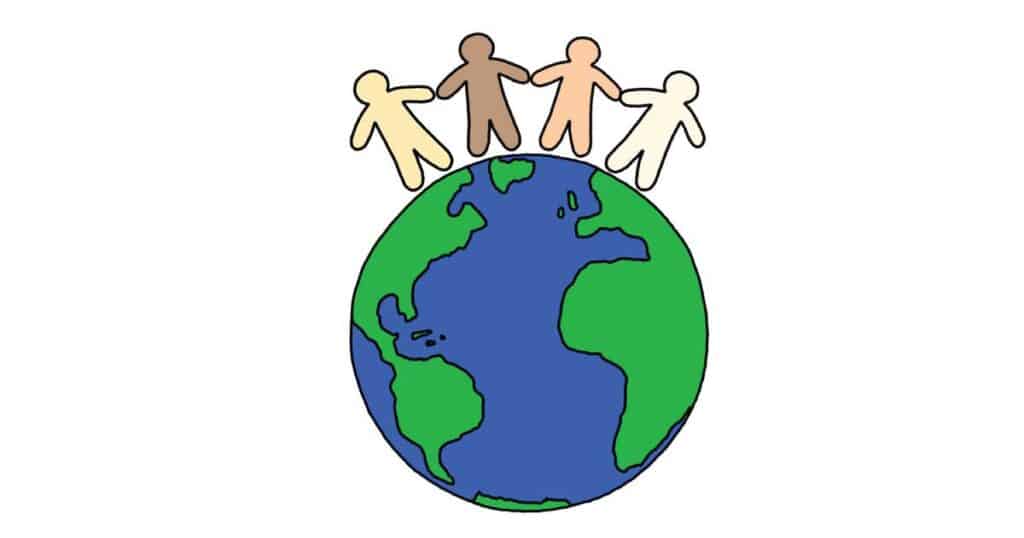
According to Emma Dominguez, Roosevelt senior and co-president of La Raza, “It’s important for us to come together and appreciate that we’re here for one another.” The clubs offer a space for education, community, and cultural celebration.
Victoria Macabú, Roosevelt senior and fellow co-president of La Raza, said, “[Advocacy] is not really our job, our job is to have a space for students and to feel comfortable at our own school.” She added that it’s important to be seen as a cultural acceptance group, and that it’s “the reason why we have our own group, so that we can appreciate our own culture, and let other people appreciate our culture if they are so inclined.”
Some students maintain the balance of practicing their culture and living as high school students through study abroad opportunities. Others may find part-time work in their communities. Many embrace religious practices of their culture, eat foods that remind them of their background, spend time with their families, or all of the above. Each has a unique perspective to offer on what it means to keep in touch with culture as a teen and a full-time student.
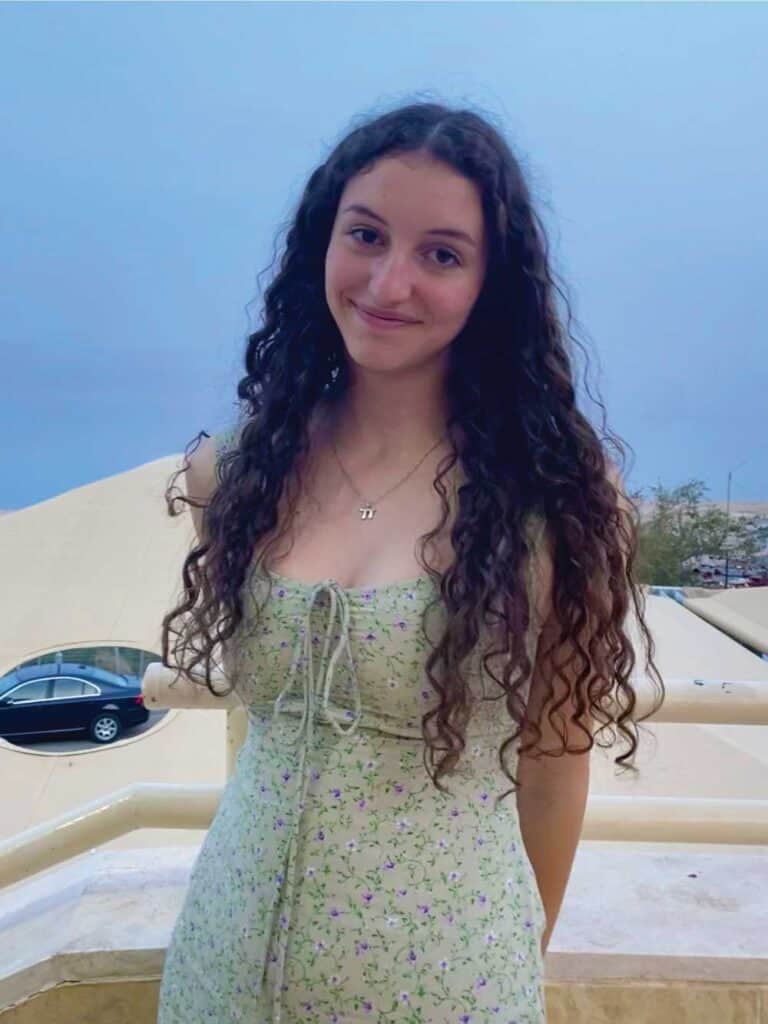
Tova Korry, Junior
Junior Tova Korry has been raised Jewish. She shared that participating in Jewish cultural practices brings her a lot of joy and pride. She loves the community, the food, and learning about Judaism.
Tova started Hebrew school in kindergarten, like many Jewish American kids. She explained, “As you get older, you start to learn the Hebrew alphabet, and more prayers, and the actual different sects of Judaism.”
Going into middle school, she remembers starting to learn more about the prayers needed for her Bat Mitzvah. Tova added, “Then you have a tutor to help you learn all the prayers that you need to, and your Torah portion for your B’nai Mitzvah, and then you have your B’nai Mitzvah, and that is probably the peak of most people’s learning.”
Jewish learning and communal participation are passions of Tova’s. One year, a rabbi at her synagogue asked her to read Torah for the Yom Kippur service. She expressed taking great pride in that experience, as it is a big honor.
Yom Kippur is one of the High Holy Days of Judaism. Tova celebrates all of these holidays, including Yom Kippur, Sukkot, and Rosh Hashanah. “Yom Kippur, that’s probably one of the biggest, I fast for a day.” Tova recalls going to services for Yom Kippur, saying there was always music, and that she loves Hebrew songs.
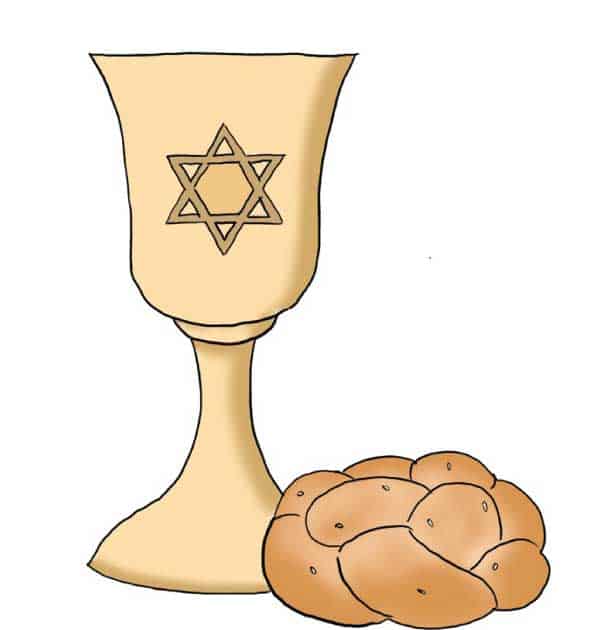
“I tried to go to synagogue for one of their services, [but] I didn’t get to go this year, because junior year includes a lot of homework, and I feel like I can’t miss school.” She shared that she’d like to go to more services, but with homework and extracurriculars, that proves difficult. Tova expressed some frustration with not getting Jewish holidays off and added that she chooses school, homework, and extracurriculars over going to services most of the time, so as to not fall behind.
For some high schoolers, studying abroad provides the opportunity to stay connected with their heritage while being students. Tova spent the second semester of her sophomore year in Israel. She said at first she couldn’t imagine being that far from her family, “and then COVID hit, and everything shut down. And I was stuck with my family for two and a half years. And I was like, I have to leave.”
Tova said being in Israel and learning about Judaism was very different from anything she’d experienced. In class, she and her peers would learn about something and then visit the historical or holy site the next day. “What they taught me in [American] school [about Israel] was from the U.S. point of view, like politics and the economy. … The cultural experience was amazing.” She explained that going to Israel opened up her world, “Here, it’s like a warm hot tub. … When I went there, it was like being dunked into a tub of ice water.”
Tova described her study abroad as a spiritual experience, as she was surrounded by the locations of religious events. This strengthened her connection with Judaism. She also said that going to school in Israel made it easier to balance religious practices with school. There was cut-out time for celebration, time that she has to make for herself when in Seattle. She explained this made it easier to practice the way she wanted, without school getting in the way.
Tova added, “I’ve never been somewhere where I walk around and I just know that most of the people around me are Jewish, and that’s a really cool feeling.” She said she didn’t know what to compare it to, but that it was comforting, “I love being able to experience the ethnically rich culture and the people and perspectives within it.”
Tova continued, “I’m super proud of myself for continuing to learn about Judaism, and going on that adventure of going to Israel and continuously learning and educating myself.”
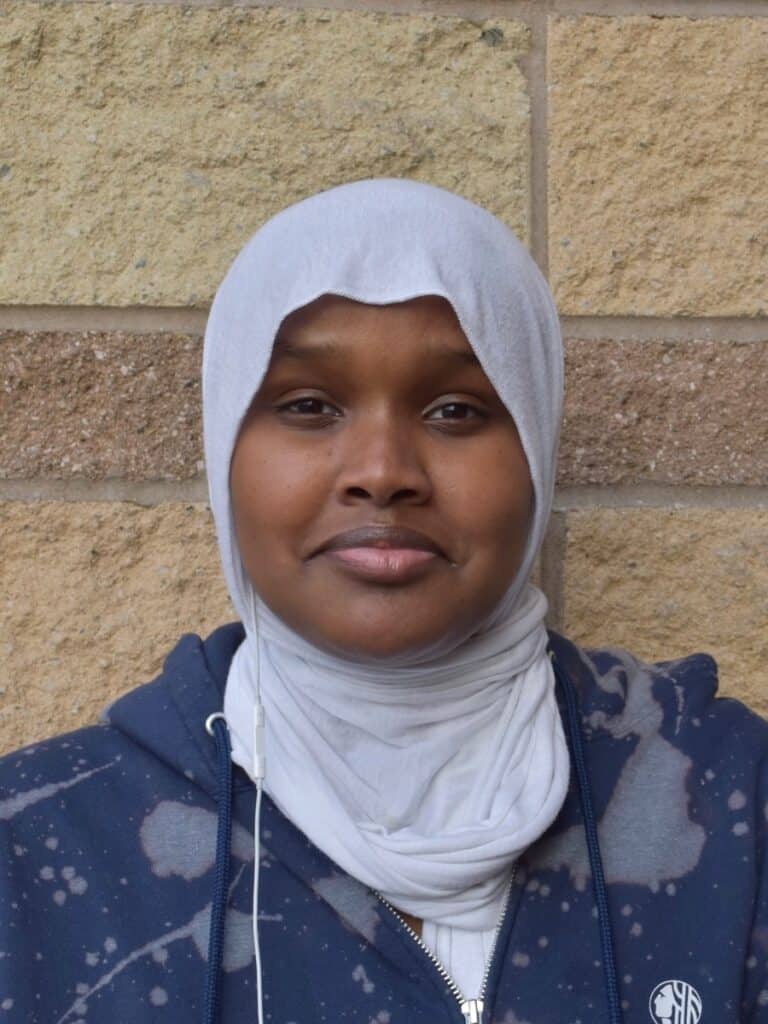
Fartun Abdullahi, Senior
Senior Fartun Abdullahi was born in Somalia, but she immigrated to Kenya and then the United States when she was about 3-years-old. “Coming to [the United States], where there’s so many people who don’t look like me or don’t believe in the same things that I do, it was just kind of confusing. … Me and my family, we’re all by ourselves. … We had to learn English, adapt to a place we’ve never been, never learned about.”
Fartun explained that her family left Somalia due to growing instability in the country. According to the UN Refugee Agency, over the last 30 years, hundreds of thousands have emigrated from Somalia due to a civil war and political instability that broke out in the 1990s.
Fartun noted the complex emotions that followed her family’s move. “Growing up, it was rough for me, but more rough for my family and my mom and dad. Because they had to learn everything alone.” Fartun said that that experience has shaped her positively, “I just try my best to keep an open mind, especially with people who don’t have the same beliefs [or] ideologies as me.”
Fartun still has family living in Somalia, and she said it’s scary having loved ones in a crisis zone. Conditions there are still challenging for many Somalians.
According to Human Rights Watch 2020 World Report, the country’s primary obstacles include domestic terrorism, government corruption and suppression, and public health issues. These issues have led to an internally displaced population of at least 2.6 million people. Fartun explained that for some, leaving is not a viable option: “Even though it’s very corrupt, it’s just kind of hard to get out.”
She shared that she has lost family members in Somalia. She added that her family doesn’t talk about it much, and that it’s very hard to.
Fartun has not yet met some of her family abroad, only seen in pictures. She said that getting calls saying that family members have passed is scary. She described the suspense that comes with this, “waiting for the next call, whether it’s an auntie who passed away, uncle, grandma, grandpa, cousins, nephews who are younger than you.”
Fartun explains that in grieving her family that have passed, it is something that makes her recognize the privilege she has living in the U.S. “Once you have your people there, or your family there, it’s hard, because you’re living a good life in America, but they’re struggling to get out.”
Fartun spoke about how important family and community are to her and credits her older sister, Maryan, as being the one she always leans on. One way Fartun embraces her love of community is through her Muslim faith. She explained that her education on Islam began around 7-years-old.

She explained that interacting with kids that looked like her and shared beliefs was comforting, “It’s a good feeling to have people who are like you and be able to depend on them.” As she went to her mosque, took classes, and learned about religious texts, Fartun formed important relationships that she maintains today.
Fartun described Ramadan and Eid as her favorite Muslim traditions.“[Celebrating Ramadan] is one of the things that makes me who I am, and makes me care for community and the people around me.” Ramadan is a religious holiday involving fasting, praying, and being around loved ones. Fartun said she enjoys it because it’s a challenge. She also reiterates community as a pillar in her life, “It’s an appreciation for the people who have struggled for us and who have struggled for my belief. And I love it. Because it’s a way to bring community together.”
In addition, Fartun said Black Student Union is a place where she can talk about her life experiences and her fears without judgment. “I can be vulnerable and be uncomfortable with them, that I can’t be in a white classroom.” She said, “I can just sit there and look around and be like, no one’s gonna judge me if I share the experiences that I’ve faced. No one’s going to look at me weird.”
Fartun said that the media’s portrayal of Muslim people is something she automatically faced when moving to America, “You’re automatically given that title, you’re automatically given the title of a terrorist, or you’re automatically being seen as a person who could cause a lot of damage. And I feel like that’s just the image in America.” But she added that she uses these experiences to connect with people, “I use it as a positive lens, not the negative one I’ve been given my whole life.”
When prompted to think about joy and pride surrounding her identities, Fartun said three things: “family, community, relationships.” She consistently reiterated the importance of these elements in her life, how they have shaped her, and how she uses them to uplift others.
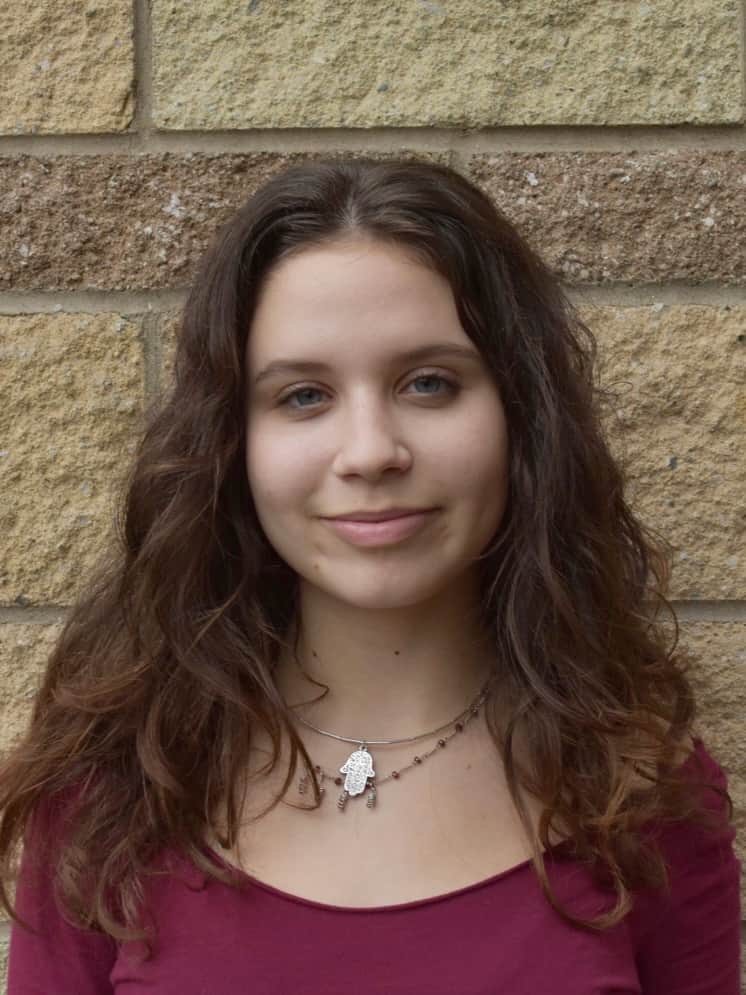
Shira Pinker, Senior
Senior Shira Pinker is a part of a conservative Jewish family, which means that they believe the authority of Jewish law and tradition comes primarily from the people and the community through the generations — more than from divine revelation. It has no correlation to the political connotation of the term “conservative.”
She explained that for her this means participating in High Holidays, some more minor holidays, and having a kosher diet. She added, “I don’t follow all of the rules, because they’re a little bit much [for me], but I don’t eat meat at all, so I don’t have meat and dairy together. So I follow that.”
When Shira was younger, she attended a Jewish sleep-away camp: “It was really fun to be able to go and be part of a community where everyone is Jewish and kind of all have that in common. And it just gives you a big sense of community, it kind of feels like one big family. … You just feel like you’re at home.”
Shira shared that her Jewish community is very present in her life. She finds that feeling with family, her synagogue, and her Jewish friends. “I think that being Jewish in America is pretty interesting because technically we are a minority, but I feel like there’s always Jews around me, so I’ve always had a community.” However she added that she wishes people knew more about Judaism beyond a basic level. “ It would be nice, I think, if people knew a little bit more about [Judaism].”
She explained that it’s difficult especially as a Jewish student, because many teachers lack awareness about Jewish traditions throughout the school year. “We always have to miss three days of school right near the beginning of the year, and it can be kind of hard to catch up from that. And a lot of teachers … and people don’t really notice. … This happens every year for me.”
Shira expanded that it is difficult for her to partake in traditions such as regularly attending services or keeping Shabbat, “I have other stuff that I need to do or want to do, I just have other obligations. So I mean, ideally, I would be able to do it all. But at the end of the day, you just can’t really do it all.” She noted her family used to go to her synagogue a lot more, “As I’ve gotten older, and after COVID, me and my family have gone less than we used to.”
Shira shared that at her age, she has to be more proactive in participating in Jewish traditions. “Now I have more autonomy to do that myself, if I want to be involved in my culture, but obviously, my family is still a big part of that.”
Despite the constraints of balancing student life and Jewish life, Judaism is a big part of Shira’s identity. “I choose to do these things not just because it was how I was raised, although that’s probably the main factor, but I continue to choose to do these things because it’s a part of who I am and it gives me a sense of community.”
One way Shira stays active in her community is as a student leader for B’nai B’rith Youth Organization. She described, “I feel like that’s a time where I can be around other Jewish teens, and it’s nice to get that, especially because it’s not really a huge part of my experience at Roosevelt.” She said her chapter doesn’t usually meet to do activities directly related to Judaism, but “It’s just kind of nice to be with a group that is Jewish.”
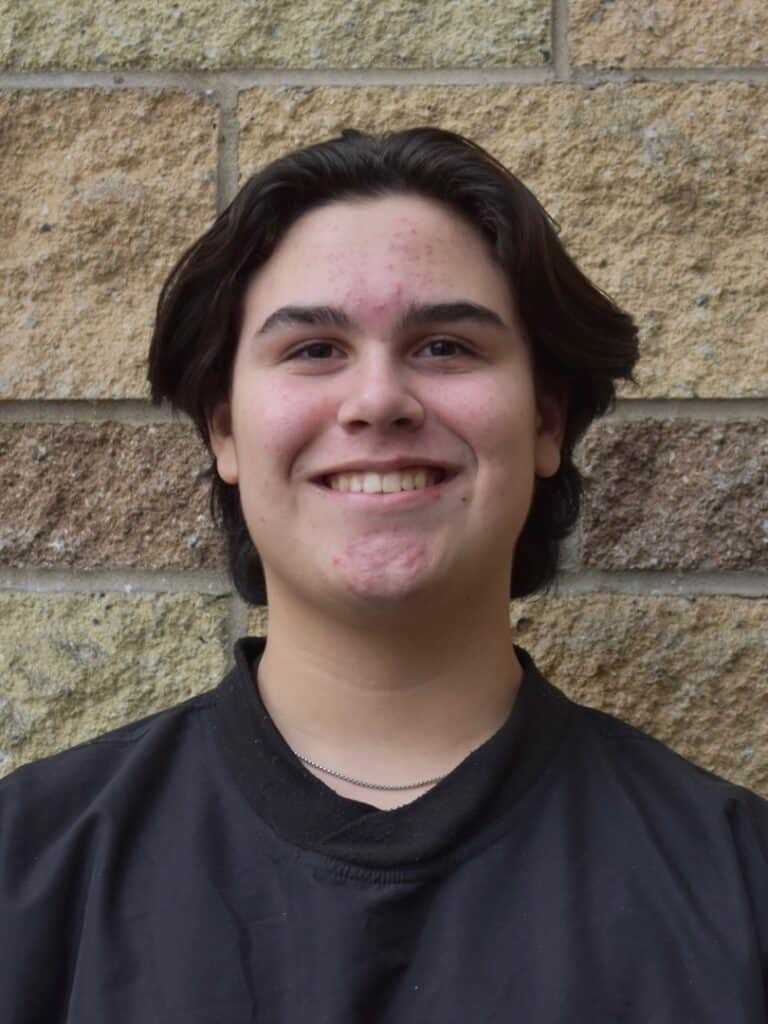
Vincent Dotta, Junior
Junior Vincent Dotta believes if he didn’t embrace his Mexican heritage, he would feel “like a piece was missing that I didn’t get to experience or know. … I would feel kind of lost.”
Today, Dotta embraces and appreciates his background. “To be honest, I like the food. The food is the best part,” he joked. One way Vincent and his family practice Mexican culture is through traditional celebrations such as Día de los Muertos.
Known in English as “Day of the Dead,” the holiday is observed on Nov. 1 and 2 across Latin America, although it is most popular in Mexico.
According to the Smithsonian Mexican Museum, “Día de los Muertos acknowledges the symbiotic relationship between life and death. … The spirits of the dead are believed to return home and spend time with their relatives on those two days.” Families spend days creating offerings and shrines, decorating cemeteries and homes with colorful marigold flowers, and preparing to welcome their loved ones back.
Vincent said he and his family participate by “making all different kinds of meals, and lighting candles for an ofrenda.” An ofrenda is an elaborate shrine with photos of the deceased loved ones. The favorite foods and items of the deceased are placed next to their photo.
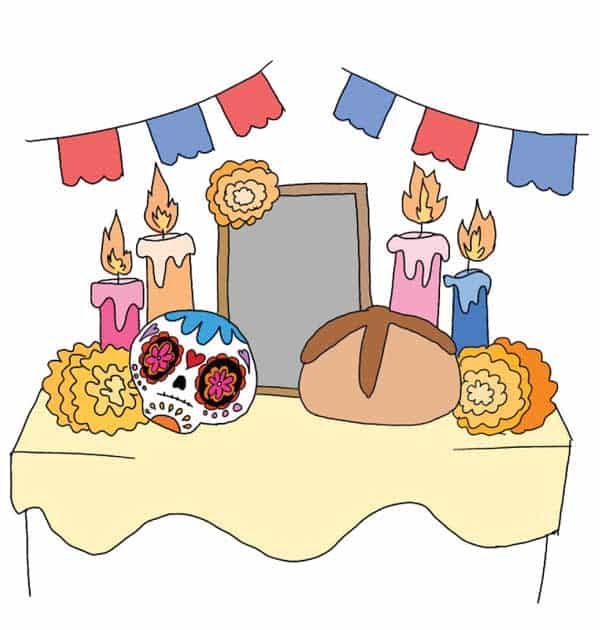
Vincent said the ways his family practices their culture differ from his extended family. He has relatives outside of the United States, which offers him an alternative perspective. “We do things Americanized,” he explained. “Going outside the U.S. and seeing how things are done is quite the experience.”
He described that as much as he enjoys having international relatives for those reasons, it can also be scary when he hears about the things happening in Mexico, such as how a town near his cousins was raided. “You feel powerless when you hear about these things,” he said.
Vincent revealed that despite how much he enjoys cultural traditions, he wasn’t always comfortable in his Mexican identity. He said that in middle school, he was teased for his ethnicity. “I went to an all-white school, and there were lots of microaggressions, like, ‘Why does your lunch smell like that?’ ‘Are you eating roadkill?,’” he recalled. “It was something I was sensitive about.”
The discrimination Vincent faced compelled him to hide his heritage and his true self. “For a couple years I only told people I was white just because I saw it was working and I wasn’t being teased as much for my cultural background.”
Vincent described that the shame he felt began to shift once he entered high school. “Seeing other people who look like me and go through the same things made it easier for me to claim my identity.” He said he felt welcome at Roosevelt, but “not because of what the school or student body is doing, it’s being in the presence of people like me.”
Vincent is an active member of La Raza at Roosevelt. Vincent said La Raza is a club and safe space for Hispanic students and allies to learn about South American culture and talk about ways they can help problems in other countries.
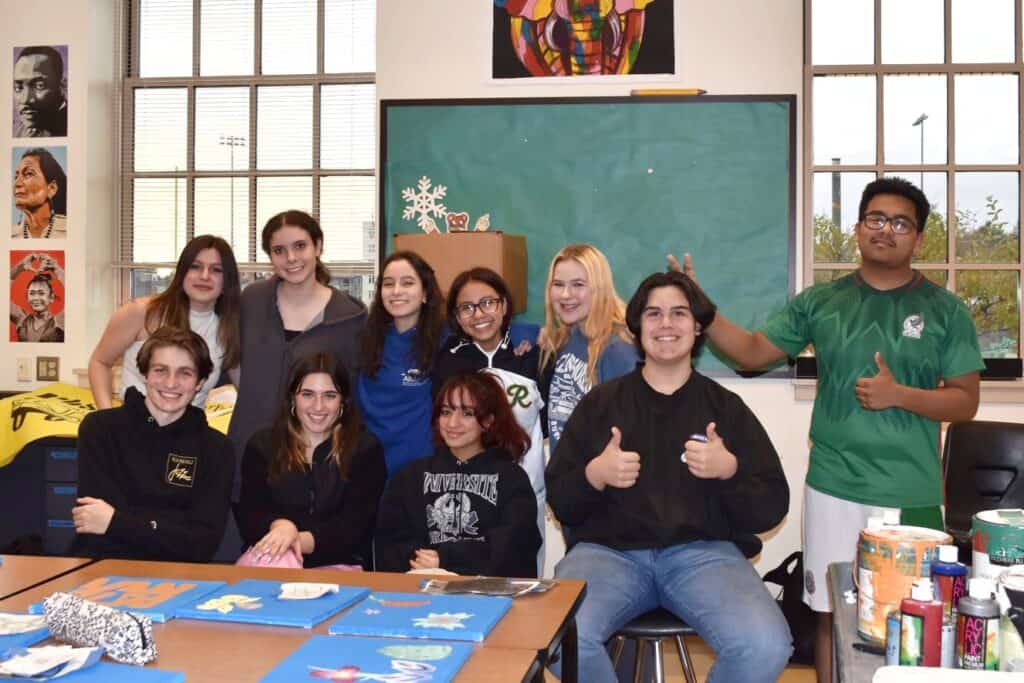
His experience was immediately positive, he shared, “I went with [my friend] after school and immediately was blown away at how welcoming everyone was. It was nice.” To him, La Raza is “a big family that meets once a week.”
Joining La Raza has impacted Vincent’s daily experience at school, “I have more friends with the same ethnic and cultural background. I just have more friends in general. It’s a great way to meet more people,” he explained.
Outside of school, Vincent said he feels very comfortable in his identity while at his job and with his family. He works at a local Mexican restaurant, Rosita’s Mexican Grill, in Greenlake, which he described as a positive experience.
He also stated that his family has a big influence on his sense of pride to be Mexican. “I have a lot of Mexican family members and they claim their nationality, they hold it dear to them and my family immigrated, it would be disrespectful for me to claim my white identity and forget about all that stuff.”
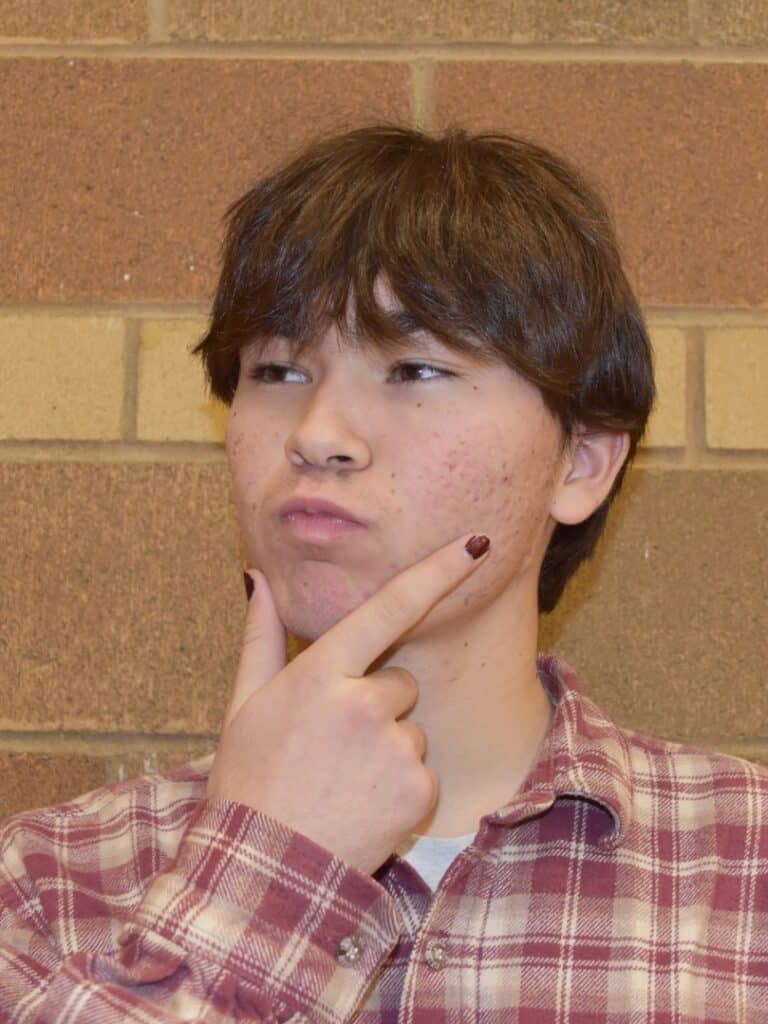
Alan Brennan, Sophomore
Sophomore Alan Brennan is Kazakh, a Turkic ethnic group native to Northern Central Asia. He’s also a member of the Asian Culture Club. Alan shared that his relationship with his background is complicated, “I’m not really connected. It’s just my family. … I’m pretty much just American.” Despite this disconnect, Alan does try to embrace his Kazakh heritage through family, history, and especially food.
“I love the food, I eat it a lot.” In fact, food is what Alan loves most about being Kazakh. She says that food is a big part of Kazakh culture. Her favorite dish is Beshbarmak, one of Kazakhstan’s national foods. It translates to “five fingers,” as it is traditionally eaten with the hands. Beshbarmak is made from chopped, boiled meat, egg noodles, and an onion sauce called chyk. He said that when he goes to family events, he always looks forward to the food.
At these events, Alan gets to see family who live nearby, many of whom are distant relatives. However, not all of his family is so close. His grandma lives in Almaty, Kazakhstan. Alan described that his family visits Almaty every four years, and they always ride the gondolas in Almaty through the mountains to a carnival. While visiting Kazakhstan, his family often participates in typical tourist activities, alongside shopping and cooking. Alan likes traveling there because “it’s refreshing to get away from the suffocation in Seattle.”
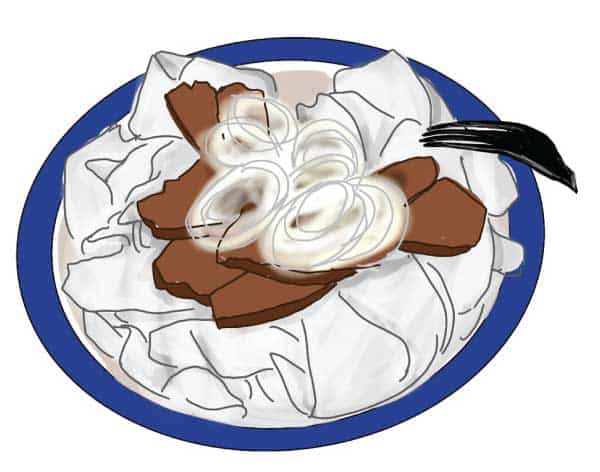
Aside from family events and travel to Kazakhstan, Alan’s knowledge of Kazakh culture was limited for much of her life. Alan shared that when he was young, “My mom said I should learn about my culture. … I was very small and I pretty much said no. So I didn’t really learn much but now I’m learning through my ethnic studies class.” He has found the experience of learning about Kazakh history in school very important to his understanding of his heritage. She especially liked learning about the history of music in Kazakhstan, and said that’s part of what makes her proud to be Kazakh.
Even though he has learned about his culture through classes at Roosevelt, Alan has nonetheless experienced discrimination at school. “People will say stuff and it doesn’t really matter, but it makes me sad,” he said. “It makes me feel unwelcome, but where is it going to be better?”
Alan noted that there are almost no places in Roosevelt where she feels truly comfortable expressing her Kazakh identity.
One of the goals of many cultural affinity groups at Roosevelt is to create a safe space for students such as Alan to freely embrace their heritage. Alan shared that she feels more comfortable expressing her Asian identity at the Asian Culture Club. She said that she likes the ACC because “it’s fun, and they have food.” He described that the purpose of the ACC is to “unite people who identify as Asian.”
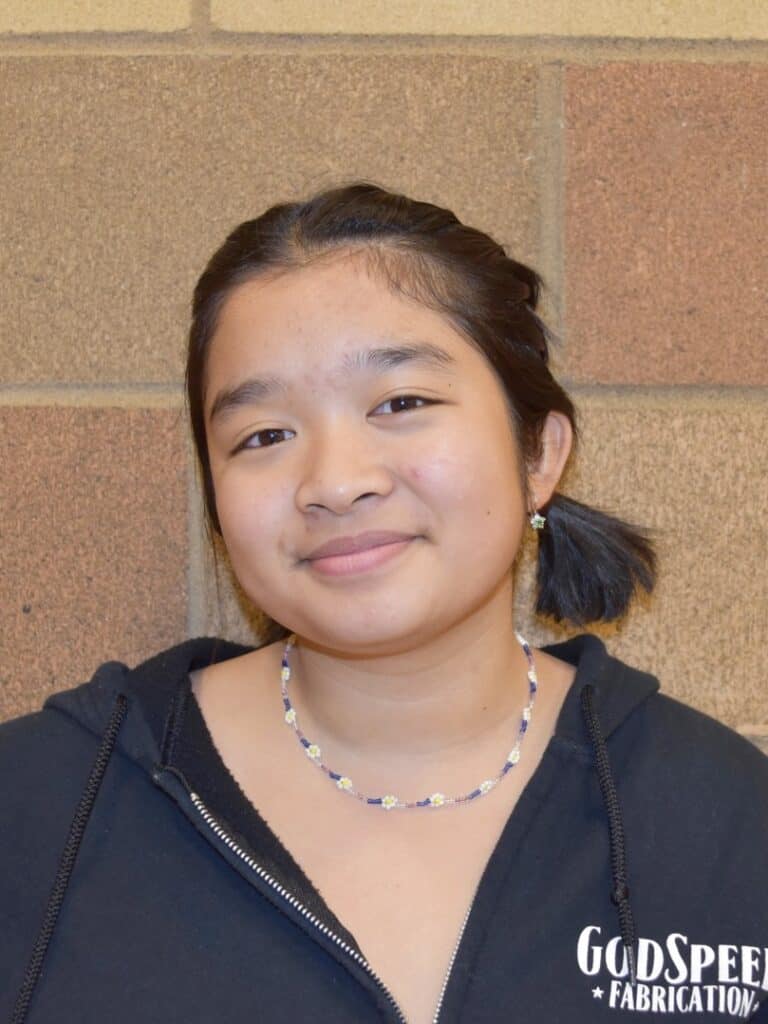
Kaitlyn Vu, Sophomore
To sophomore Kaitlyn Vu, staying in touch with their Vietnamese culture is important because of how they view their standing within their community.
“I consider myself a very privileged Vietnamese person, living in the United States,” she said. Vu shared that her parents immigrated to the United States by boat in order to build the life they have now. She commented that her parents’ story is a big source of pride for her. “I hope to make that life better as they get older,” she added.
Kaitlyn feels a deep sense of pride and joy from other aspects of her heritage as well.
She enjoys participating in Vietnamese culture and the connection that it brings her with other Vietnamese people. She attends a Vietnamese church, goes to Vietnamese parties with her family, and celebrates holidays such as the Vietnamese Lunar New Year.
To Kaitlyn, family and community are quintessential aspects of her experience being Vietnamese-American. She credited her extended family with helping to deepen her understanding of her identity, “I learned the most about my culture from my grandparents. They’ve taught me everything I know. From my uncles, my aunts, from the communities I’m around.”
The majority of Kaitlyn’s extended family still lives in Vietnam. She shared that she treasures when they are able to visit her, “I’d teach them to do different American things, … and they’d teach me everything that they do over there. … It broadened my view of the world.”
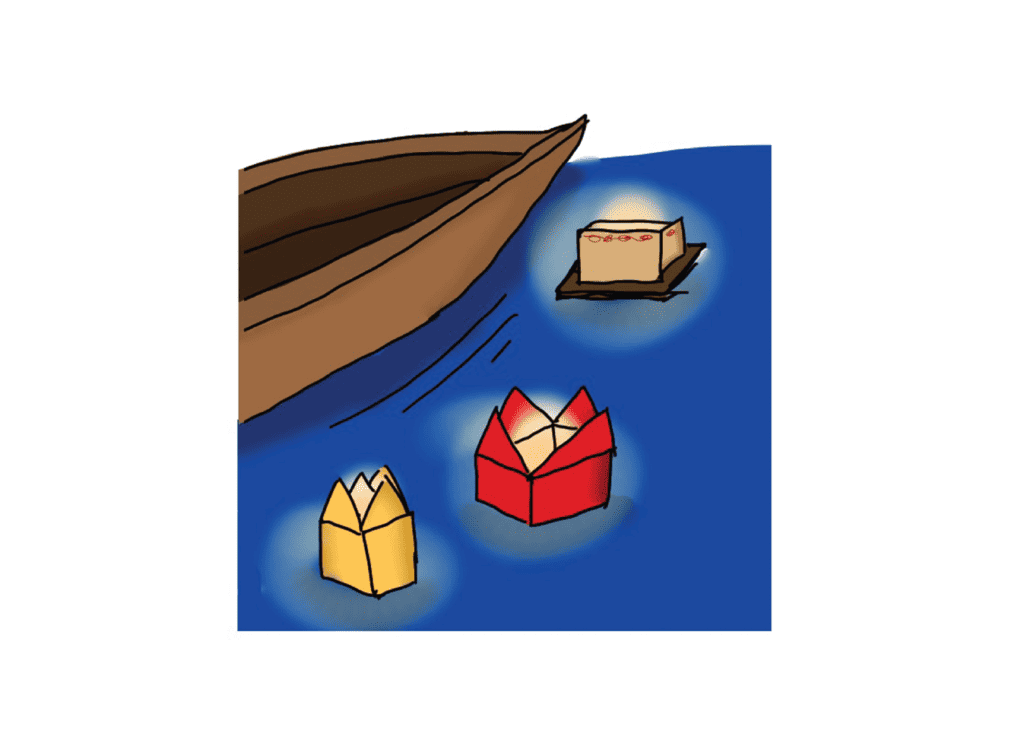
Being surrounded by a strong Vietnamese community makes Kaitlyn feel comfortable, and she explained that it is a positive experience for her. She highlighted that she enjoys speaking a language besides English at home and with those she’s comfortable with.
This experience can be drastically different from Kaitlyn’s experience at school, where the vast majority of her peers cannot relate to her cultural background. 70% of Roosevelt High School students identify as white. According to Public School Review, only 10% of Roosevelt students are Asian. Kaitlyn observed that at school, “It’s hard to find people who look like me.” She also emphasized the lack of teachers of color at the school.
Kaitlyn has faced racial discrimination at Roosevelt, as well as during middle school. She explained, “I was getting blamed for COVID. … I was getting things thrown at me. … I got locked in a locker.” She said that especially once she arrived in high school, it made her want to find people like her, with shared experiences. “I know a lot of us are going through the same thing.”
For Kaitlyn, Asian Culture Club provides a slice of that comfortable experience while at school. They stated that being a part of the club “makes it kind of easier to be at Roosevelt.” She added that it’s the first cultural affinity group she’s ever had the option to join at school, and it’s an experience she values greatly.
Follow The Roosevelt News on Instagram @therhsnews. Questions, comments, or concerns? Contact the Editorial Board at therooseveltnews@gmail.com.
Your voice matters. Share your thoughts and experiences in the comment box below.
